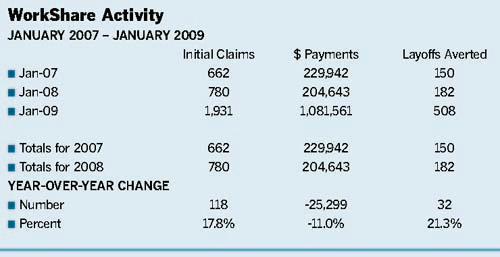Lincoln manufacturer ChemArt has looked at the usual places to cut costs in an attempt to avoid layoffs as the economy slows:
The family-run company that makes decorative ornaments and collectibles has started scheduling its 85 employees to minimize the use of lights and heat. It’s putting a renewed emphasis on recycling to reduce trash pickup costs. The company is considering banding together with business neighbors to hire one snow plower and shared the bill.
Now ChemArt is one of a fast-growing number of companies that has turned to a special state labor program that allows businesses to steer clear of difficult layoffs in a different way.
The R.I. Department of Labor and Training says the use of the WorkShare program – which allows companies to cut employees’ weekly hours while enabling those workers to collect unemployment benefits for the missed time – is booming, with the number of employees filing claims under Workshare last month more doubling the number in November.
And, unlike in years past when most of the companies that signed on to the program were manufacturers, participating businesses now run the gamut, from plumbers and boat builders to information technology firms and financial institutions.
“Companies don’t want to lay off and they’re looking for whatever means to prevent them,” said Ray Filippone, assistant director of income support at DLT. “They are doing whatever they can do to retain skilled workers.”
Rhode Island businesses aren’t alone in their efforts to avoid handing out pink slips.
Nine out of 10 companies nationwide have attempted some type of cost-cutting moves to avoid job losses, from reducing travel expenses, to canceling holiday parties to instituting hiring and pay freezes, according to a survey released last month by Chicago-based job placement consulting firm Challenger, Gray & Christmas Inc.
Still, Rhode Island businesses have really felt the squeeze from the slowdown. The state’s unemployment rate reached 10 percent in December, one of the highest rates in the nation.
The WorkShare figures are just another sign of the times.
State labor officials say 1,931 workers filed initial claims under the WorkShare program last month, up from 1,409 in December and 807 in November. Meanwhile, the amount of unemployment insurance benefits paid out to workers in Workshare totaled $1.08 million last month, up from $375,533 in November.
“These are the highest numbers I can recall,” said Filippone.
At the same time, DLT calculated that WorkShare averted 2,934 layoffs in 2008.
Under the program – Rhode Island is one of 19 states that offers work-sharing benefits – a company can cut hours for all full-time employees in a division or unit by as much as 50 percent, and those workers can collect unemployment for the lost hours. Enrolled employers must show that the cut in hours is the result of a temporary economic slowdown.
Filippone noted that if the worker has a second job – or even takes a part-time job during those lost hours – it won’t affect the amount of unemployment benefits that person receives.
If a worker has their hours cut by 20 percent, she will get 20 percent of their full unemployment insurance rate for up to 52 weeks.
It ends up being a net loss in pay, but at the same time, that worker is able to maintain her employer-provided health and retirement benefits, Filippone said.
In ChemArt’s case, 65 hourly wage employees in assembly, manufacturing, graphics, sales and marketing had their workweek reduced to three or four days because of a slower-than-expected first quarter, according to Rob Calef, ChemArt human resources manager.
Calef said the company has used the WorkShare program in the past, but the number of ChemArt employees participating this time around is higher than usual.
“The last resort is to let anybody go,” said Calef, pointing out that the average ChemArt employee has worked there eight to 10 years. •
No posts to display
Sign in
Welcome! Log into your account
Forgot your password? Get help
Privacy Policy
Password recovery
Recover your password
A password will be e-mailed to you.











